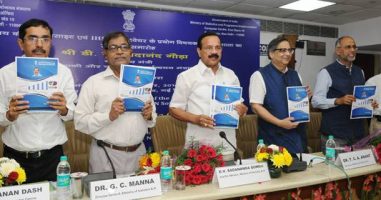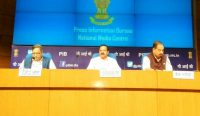
The International Household Survey Network (IHSN) is about the latest trends & developments of data archives, storage and dissemination technology tools available to Users.
The Micro data Management Toolkit developed by the World Bank Data, Asian Development Bank, ADP (Accelerated Data Program), OECD (Organisation of Economic Corporation and Development & PARIS21 for the International Household Survey Network (IHSN) is open source data, DDI (Data Documentation Initiative) compliant application for cataloguing and dissemination of Metadata & Microdata. The International Household Survey Network (IHSN) is designed to address the technical issues facing data producers.
The Minister for Statistics and Programme Implementation, Shri D.V. Sadananda Gowda, inaugurated the 1st Workshop on the use of IHSN Toolkit and also launched the new Website of the Ministry.
The Minister in his address emphasized that collection of huge data is not enough and does not serve any purpose unless it is used for policy decisions, administrative purposes, academic research which impact the lives of the common man. For this, it is important to process, document and store the data to build a robust Catalogue of data of international standard and quality information. On the launch of the Website, Shri Gowda remarked that a ICT product like website is a means to an end and not an end in itself.
Secretary and Chief Statistician of India, Dr. T.C. A. Anant in his key note address, stated that using good standardized methods is important, as is making the data available to users is equally important. IHSN is a standard bench mark which can be used as an active management tool for better integration of administrative structures and statistical access for policy making.
Components of Toolkit are:
Metadata Editor – Allows the user to add survey metadata and create the ddi.xml and as Nesstar study document.
CD-ROM Builder – Allows the user to generate HTML output from the study that can be published on a CD or the Internet for dissemination.
NADA – Search engine that allows the user to import the ddi.xml and search for variables and view metadata.
The Ministry of Statistics and Programme Implementation will be organizing six workshops at different locations of the country to sensitize the State/UT Governments and also use of Sixth Economic Census data for smart cities, augmenting revenue for the states, credit planning for small enterprises and evaluating success of various schemes etc.
The Survey and Census micro data are valuable resources for government departments and academic researchers. They constitute valuable and irreplaceable assets and should be managed in a way that encourages their widest possible use and re-use. At the same time, protecting the privacy of survey respondents is a paramount concern of data collectors. Robust procedures are necessary to reassure stakeholders that micro data will be disseminated and used in an optimum manner for the benefit of users and everyone in society, now and in the future.
It has been experienced that IHSN tool is quite useful for creation of documentation, dissemination and archive as well as survey data can be transformed into an international format. It would attract more users, researchers, increase the revenue towards data dissemination and reduce the data duplication, increasing return on investment etc. After conducting a survey, the agencies that collect data normally produce a wide range of tabular output to give users the highlights and a broad overview of the results would be available at one source.
In order to strengthen the statistical system of the county, the Ministry has created complete metadata of 140 survey and census conducted under the National Sample Survey(NSS) programme, Annual Survey of Industries(ASI) and Economic Census currently available with the Ministry and has decided to transfer the technology to all State/UTs to create unique statistical system of the country to facilitate the users.
The metadata now provided in the archive includes, survey methodology, sampling procedures, questionnaires, instructions, survey reports, classifications, code directories etc. Importantly the archive provides all details of the data files that are disseminated to users along with case summaries at one source.







Leave a Reply
You must be logged in to post a comment.